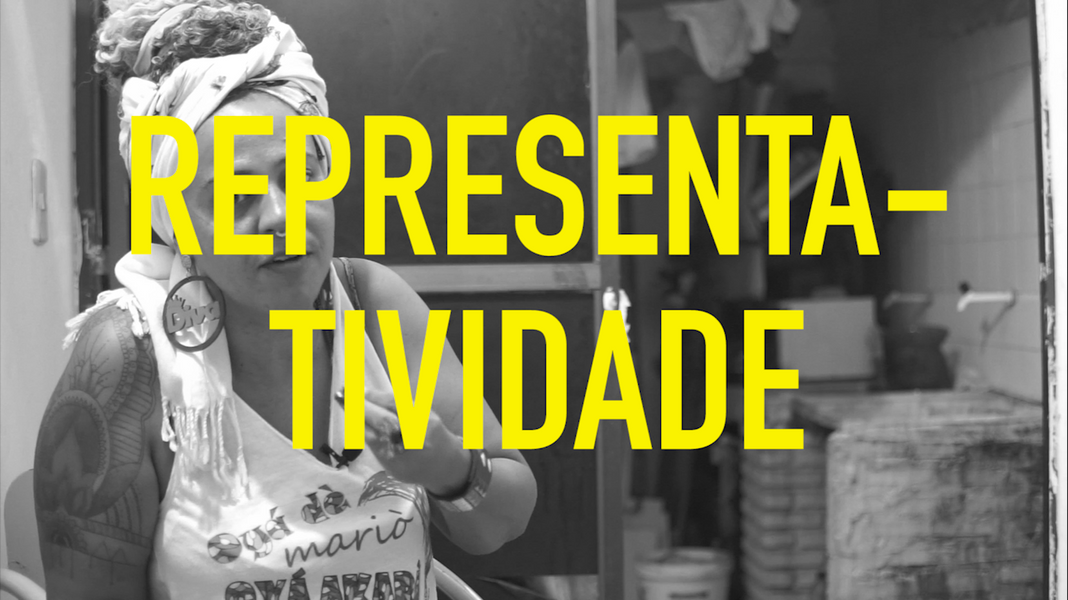


2022

.png)



.png)

WOMEN
IN
MOVEMENT

"Women in Movement" composes a living archive, moved by the pressing need of articulating struggles, voices, and political grammars. The film proposes a politics of speaking and a poetics of listening, in which a relational dialogue between thinking and feeling, private and public, theory and practice, knowledge and experience, domestic and political is continually bridged.
Shot in the cities of Rio de Janeiro, Salvador and Manaus, between May and June 2018 - a few months after the femicide of Marielle Franco and in the context leading up to the main Brazilian elections in October, that would elect an authoritarian far-right candidate as a president of the country.
Winner of the Presence Award at the Alter do Chão Film Festival (Brazil 2020), Finalist at the Lift-Off Global Network Film Festival (UK 2020), and chosen by the Official Selection of the Art200 International Queer Film Festival (Romania 2020), Latino & Native American Film Festival (USA 2021), Cine Luso Espirito Mundo (Belgium 2021), Africa Human Rights Film Festival (South Africa 2021), For Rainbow Film Festival (Brazil 2021), Cinema of Nations (Germany 2021), Kalakari Film Festival (India 2022), Native Women in Film Festival (USA 2022) and Festival Internacional de Cine de la Non-Violencia Activa (2022).



"Mulheres em Movimento" (Women in Movement) is an independent film, produced in parallel to my doctoral investigation, namely "Cartographies of Survival. Disputing Democracy, Reimagining Community" (Streva 2020). By combining anticolonial, critical race and feminist praxis, the present work aimed to disrupt the mechanical reproduction of what has been considered as 'academic' and 'scientific' knowledge, and to materialize another praxis driven by the political practice of careful listening.
The conversations were situated in the cities of Rio de Janeiro, Salvador and Manaus:
1. Rio de Janeiro/RJ located in southeast of Brazil.
In the decade of 1730, the port of Rio de Janeiro became the main port of the country, receiving two thirds of all slave-ships coming to Brazil. The city was the only case in the modern history in which the Empire established itself inside the colony. Due to the invasion of Napoleonic troops, the Portuguese royal family escaped from Lisbon to Rio de Janeiro in 1808, which resulted in the creation of a pluricontinental-Lusitanian Empire in the city of Rio de Janeiro.
2. Salvador/Bahia located in northeast of Brazil.
Salvador today has the largest proportion of Black people in the country which represents the largest African-population city outside of Africa. In 2011, it was declared the Black capital of Latin America. It was the first capital of Brazil and one of the first colonial cities in the region, founded in 1549. Salvador, in particular, and Bahia, in general, were relevant sites for revolts, insurgencies, and protests led by enslaved people. It was also a crucial territoriality in the formation of Afro-Brazilian heritages of re-existence expressed by various domains of life such as the religious terreiros of Candomblé (fostered by the influx from the Bight of Benin, the Yoruba-based candomblé stems), the practice of capoeira, the food of Orixás acarajé and abará, for instance.
3. Manaus/Amazon located in the north of Brazil.
The city was founded in 1669 and today is the most populous city with more than 2 million inhabitants, in the state of Amazon. Manaus is the only city in the Amazons with a higher percentage of women than men (51,18%), and with an intense flux of Indigenous migration.





Cartography of Movements
Rio de Janeiro, RJ
Andreza da Silveira Jorge – Casa de Mulheres da Maré, Rio de Janeiro
Shirley da Luz Villela – Casa de Mulheres da Maré, Rio de Janeiro
Gabriela da Silva Jorge – Coletivo Nuvem Negra e Rede Umunna, Rio de Janeiro
Natalia Kleinsorgen Bernardo Borges – Oitava Feminista, Niteroi/RJ
Roberta de Pádua – Coletivo Madame Satã, Rio de Janeiro
Noelle Coelho Resende – Militante de Direitos Humanos, Subcomissão da Verdade na Democracia/ALERJ, Rio de Janeiro
Kathleen Cristine Feitosa – Rede Nacional de Feministas Antiproibicionistas (RENFA), Movimento pela Legalização da Maconha (MLM) e Rede Jurídica por uma Nova Política de Drogas (REFORMA), Rio de Janeiro
Natalia Damazio Ferreira – Advogada Popular, Mecanismo Estadual de Prevenção e Combate à Tortura do Rio de Janeiro
Sandra Benites – Movimento de Mulheres Indígenas Guarani Nhandewa, Rio de Janeiro
Salvador, Bahia
Sandra Muñoz – Marcha das Vadias, Salvador
Márcia dos Santos Moreira – Grupo de Apoio à Prevenção da AIDS (GAPA), Salvador
Laina Crisóstomo Queiroz – Organização Tamojuntas, Salvador
Noélia Pires da Silva – Associação Nacional das Baianas de Acarajé (ABAM), Salvador
Ana Karen de Oliveira – Coletivo Feminista Classista Ana Montenegro, Salvador
Charlene da Silva Borges – Defensoria Pública da União, Salvador
Larissa Guedes Menezes – Advogada e Ativista Feminista Interseccional nas Organizações Teto e Tamojuntas, Salvador
Lívia Ferreira da Silva – Rede Sapata, União Nacional LGBT e Coletivo Lesbibahia, Salvador
Manuelita Carolina Machado – Movimento Feminino Novas Felipas, Vera Cruz de Itaparica/BA
Edna da Silva Pinho de Oliveira – Movimento de Mulheres do Subúrbio Ginga, Salvador
Morgana Neves Moltalvão – jornalista
Ana Paula Ferreira de Lima – Associação Nacional de Ação Indigenista (NAI), Salvador
Manaus, Amazonas
Maria Alice da Silva Paulino – Líder da Comunidade Indígena Karapãna, Manaus
Joyce Alves Gomes – Associação de Travestis, Transexuais e Transgeneros do Amazonas (ASSOTRAM), Manaus
Michelle Barbosa Andrews – Coletivo Difusão, Manaus
Baiana (Nelise Antonia Aragão Fagundes) – Associação de Prostitutas do Amazonas (APAM), Manaus
Luzarina Varela da Silva – Movimento de Mulheres Solidárias do Amazonas (MUSA), Manaus
Florismar Ferreira da Silva – Articulação Brasileira de Mulheres e Forum Permanente das Mulheres, Manaus
Joana Montanha Galvão – Associação de Mulheres Indígenas do Alto Rio Negro (AMARN), Manaus
Perpétua Pereira Cerqueira – Coletivo Yukaka, Manaus
Elvira Eliza França – PartidAmazonas, Manaus
Marklize dos Santos Siqueira – Coletivo Rosa Zumbi, Manaus
Nayara Lorena da Silva Goés - Instituto Mana, Manaus
Mayara Andrade da Cruz - PartidAmazonas, Manaus
Kátia Brasil – PartidAmazonas, Manaus
Franciley Paulo de Oliveira – Associação Orquídeas LGBT+, Manaus

Independent Film
Original title: Mulheres em Movimento
English title: Women in Movement
Runtime: 68 min
Direction and Edition: Juliana M. Streva
Camera: Juliana M. Streva
Subtitle Translation: Juliana M. Streva, Renata Gaui and Mark Farrier
Filming locations: Rio de Janeiro, Salvador and Manaus/Brazil
Editing location: Berlin/Germany
Digital Video Equipments: Sony A6000 E16-50 lens, Cube and Iphone 4s
Digital Sound Equipments: Sony A6000 and Gravador Adokey 8 1536 Kbps
2018-2020

CONTACT
Are you interested in screening our film at your school, seminar, gallery, occupation, association, collective, museum, workshop, or any another socially engaged organization without profit aims? Contact us:




































